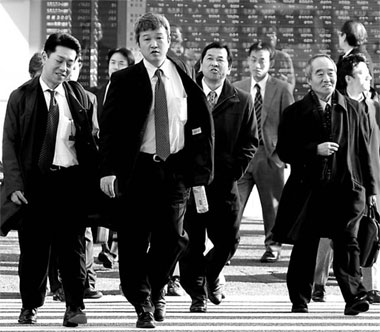Wage drop hinders spending hike
 |
| Businessmen cross an intersection in Tokyo. Haruyoshi Yamaguchi/Bloomberg News |
Monthly wages, including overtime pay and bonuses, dropped 1.9 percent in July, the eighth monthly decline, the Labor Ministry said yesterday in Tokyo.
The failure of Japan's strengthening job market to translate into higher pay is hindering growth in consumer spending, which accounts for more than a half of the economy. That leaves the nation reliant on exports at a time when a US housing recession is threatening global growth.
"Falling wages could jeopardize the recovery in consumer spending, leaving Japan more dependent on foreign demand," said Yoshiki Shinke, chief economist at Dai-Ichi Life Research Institute in Tokyo, before the report was released.
One reason average wages have slipped since December is the replacement of retiring baby boomers with younger, cheaper employees.
Another is the increased hiring of part-time workers, whose pay is on average less half that of full-timers, Shinke pointed out.
Average pay fell about 10 percent between 1997 and 2005. One in three Japanese workers is a part-timer today, compared with one in five a decade ago.
"Stalled wages is the main culprit for the weakness in consumer spending," Junko Nishioka, an economist at ABN Amro Securities in Tokyo, said before the report was released. "Without wage growth, we can't see acceleration in the economy."
Corporate sentiment
An index of sentiment among mid-size and small-size companies fell to 47.5 in August from 48.4 in the previous month, the Shoko Chukin Bank reported on Thursday. About 70 percent of Japanese workers are employed at mid-size and small-size firms.
"I can't help being pessimistic about the future of consumer spending as these smaller companies don't have the strength to raise wages," Nishioka said. She expects wages to begin to increase after the fourth quarter of 2007.
Still, "it's impossible to think that wages won't climb forever as the labor market has been tightening", Shinke said
Japan's unemployment rate fell to 3.6 percent in July, the lowest among Group of Eight nations, and there have been more jobs on offer than applicants for 20 months running. Salaries last year rose only 0.3 percent, or less than 10,000 yen ($81).
Bloomberg News
(China Daily 09/04/2007 page16)








